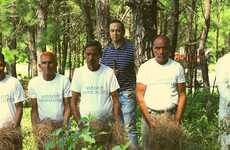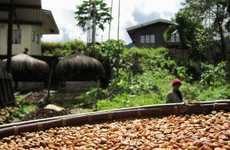
Saathi Won Harvard Business School Competition for Sanitary Pads
Social Business Editor — May 22, 2014 — Social Good
References: deccanchronicle
Saathi is the name of the latest winner of the 18th Harvard Business School New Venture Competition in the social enterprise category. The co-founders -- Amrita Siagal and Kristin Kagetsu -- won $50,000.
"Saathi provides affordable sanitary pads made from waste banana tree fibre to women in rural India," the Deccan Chronicle wrote about the venture. "Siagal and Kagetsu, who both hold mechanical engineering degrees from MIT, received a USD 50,000 prize at the competition, which supports both students and alumni launching new business and social impact ventures inspired by 'belief that one simple idea can change everything.'" According to that article, the runner-up for the same category in social enterprise was something called Tomato Jos, for small farmers in Nigeria and started by other MBA students, Mike Lawrence and Mira Mehta.
"Saathi provides affordable sanitary pads made from waste banana tree fibre to women in rural India," the Deccan Chronicle wrote about the venture. "Siagal and Kagetsu, who both hold mechanical engineering degrees from MIT, received a USD 50,000 prize at the competition, which supports both students and alumni launching new business and social impact ventures inspired by 'belief that one simple idea can change everything.'" According to that article, the runner-up for the same category in social enterprise was something called Tomato Jos, for small farmers in Nigeria and started by other MBA students, Mike Lawrence and Mira Mehta.
Trend Themes
1. Eco-friendly Sanitary Products - Opportunity to innovate eco-friendly and sustainable products for menstrual hygiene.
2. Social Innovation - Creating for-profit businesses that simultaneously address issues in society.
3. Affordable Healthcare - Innovating solutions that deliver affordable healthcare products to areas that need it the most.
Industry Implications
1. Feminine Hygiene - Focusing on creating affordable and eco-friendly alternatives to traditional feminine hygiene products.
2. Agriculture - Innovating solutions that support small farmers to grow and scale their businesses sustainably.
3. Healthcare - Developing affordable healthcare products and services to remote and underprivileged areas, leveraging technology, and automation to reduce costs.
5.4
Score
Popularity
Activity
Freshness























